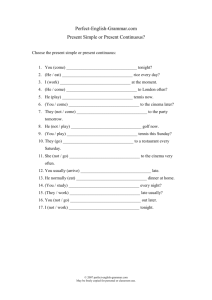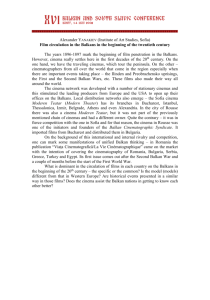S16 crslt cine
advertisement
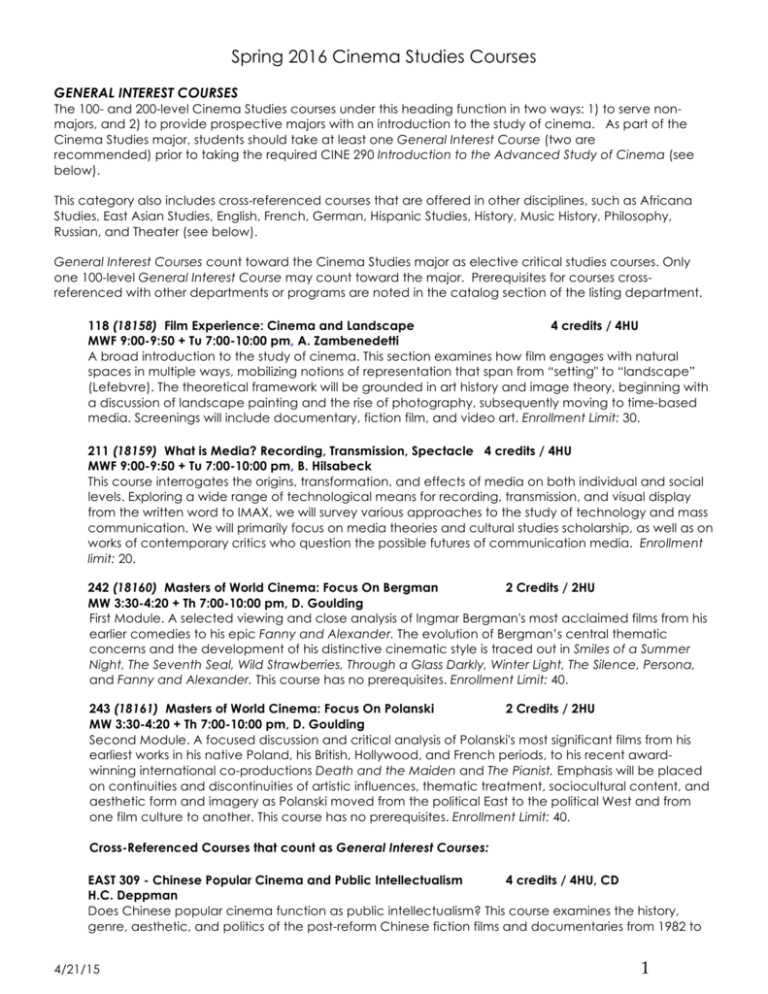
Spring 2016 Cinema Studies Courses GENERAL INTEREST COURSES The 100- and 200-level Cinema Studies courses under this heading function in two ways: 1) to serve nonmajors, and 2) to provide prospective majors with an introduction to the study of cinema. As part of the Cinema Studies major, students should take at least one General Interest Course (two are recommended) prior to taking the required CINE 290 Introduction to the Advanced Study of Cinema (see below). This category also includes cross-referenced courses that are offered in other disciplines, such as Africana Studies, East Asian Studies, English, French, German, Hispanic Studies, History, Music History, Philosophy, Russian, and Theater (see below). General Interest Courses count toward the Cinema Studies major as elective critical studies courses. Only one 100-level General Interest Course may count toward the major. Prerequisites for courses crossreferenced with other departments or programs are noted in the catalog section of the listing department. 118 (18158) Film Experience: Cinema and Landscape 4 credits / 4HU MWF 9:00-9:50 + Tu 7:00-10:00 pm, A. Zambenedetti A broad introduction to the study of cinema. This section examines how film engages with natural spaces in multiple ways, mobilizing notions of representation that span from “setting" to “landscape” (Lefebvre). The theoretical framework will be grounded in art history and image theory, beginning with a discussion of landscape painting and the rise of photography, subsequently moving to time-based media. Screenings will include documentary, fiction film, and video art. Enrollment Limit: 30. 211 (18159) What is Media? Recording, Transmission, Spectacle 4 credits / 4HU MWF 9:00-9:50 + Tu 7:00-10:00 pm, B. Hilsabeck This course interrogates the origins, transformation, and effects of media on both individual and social levels. Exploring a wide range of technological means for recording, transmission, and visual display from the written word to IMAX, we will survey various approaches to the study of technology and mass communication. We will primarily focus on media theories and cultural studies scholarship, as well as on works of contemporary critics who question the possible futures of communication media. Enrollment limit: 20. 242 (18160) Masters of World Cinema: Focus On Bergman 2 Credits / 2HU MW 3:30-4:20 + Th 7:00-10:00 pm, D. Goulding First Module. A selected viewing and close analysis of Ingmar Bergman's most acclaimed films from his earlier comedies to his epic Fanny and Alexander. The evolution of Bergman’s central thematic concerns and the development of his distinctive cinematic style is traced out in Smiles of a Summer Night, The Seventh Seal, Wild Strawberries, Through a Glass Darkly, Winter Light, The Silence, Persona, and Fanny and Alexander. This course has no prerequisites. Enrollment Limit: 40. 243 (18161) Masters of World Cinema: Focus On Polanski 2 Credits / 2HU MW 3:30-4:20 + Th 7:00-10:00 pm, D. Goulding Second Module. A focused discussion and critical analysis of Polanski's most significant films from his earliest works in his native Poland, his British, Hollywood, and French periods, to his recent awardwinning international co-productions Death and the Maiden and The Pianist. Emphasis will be placed on continuities and discontinuities of artistic influences, thematic treatment, sociocultural content, and aesthetic form and imagery as Polanski moved from the political East to the political West and from one film culture to another. This course has no prerequisites. Enrollment Limit: 40. Cross-Referenced Courses that count as General Interest Courses: EAST 309 - Chinese Popular Cinema and Public Intellectualism 4 credits / 4HU, CD H.C. Deppman Does Chinese popular cinema function as public intellectualism? This course examines the history, genre, aesthetic, and politics of the post-reform Chinese fiction films and documentaries from 1982 to 4/21/15 1 Spring 2016 Cinema Studies Courses 2014. Studying the works of Zhang Yimou, Jia Zhangke, Wu Wenguang, Wong Kar-wai, Ann Hui, He Zhaoti, Wei Desheng and others, we examine the extent to which influential directors have become a new class or organic intellectuals who raise political questions to propel social change. This course may also count toward the major in CINE and CMPL. Enrollment Limit: 15. INTRODUCTORY CORE COURSES CINE 290 Introduction to the Advanced Study of Cinema is required for all Cinema Studies majors and is a prerequisite for all advanced courses in the major (for those who declared before July 2012, CINE 299 Persistence of Vision, fulfills this requirement). Students interested in majoring in Cinema Studies should take CINE 290: 1) during the sophomore year, 2) before declaring the major, and 3) before studying abroad/away. At least one General Interest Course should be taken before CINE 290 (two are recommended). CINE 290 may not be taken in either of the final two semesters at Oberlin and still count toward the major. 290 (16038). Introduction to the Advanced Study of Cinema 4 Credits / 4HU, W-Int MWF 2:30-3:20 + Th 7:00-10:00 pm, B. Hilsabeck This course teaches students to engage critically with cinema. They examine elements of film form, style, and technique and explore how these produce meaning. Through theoretical and critical readings they consider cinema as art, industry, technology, and politics. They study approaches to watching and assessing movies, concepts and contexts in cinema studies as a discipline, and film in relation to other media. And they pay special attention to writing about cinema. Enrollment limit: 20. Production courses are not required for graduation in the major. After taking at least one General Interest Course (two are recommended), students who wish to pursue production must begin with CINE 298 Video Production Workshop I, which is a prerequisite for all advanced production courses (see Advanced Courses below for listings of advanced production courses). Students may take no more than one production course in a given semester at Oberlin (students in the Prague, Tisch, or other production programs are exempt). Production courses are selective and enroll during the first week of classes; interested students should consult with advisors and/or course instructors prior to applying for admission. Production courses require specific equipment and are assessed lab fees. In addition, students must sign and abide by a Facilities Use Contract to gain access to Cinema Studies production facilities. 298 (16028). Video Production Workshop I 4 credits / 4HU Th 1:30-4:30 + Sun 1:00-4:00 + M 7:00-10:00 pm, J. Pence This course introduces students to the practical relationships among form, style and meaning in cinema through hands-on experience with the medium's technical elements. Students will not only read about cinema but design, compose, and edit their own sequences using sound and image. Consent of instructor required by application. Enrollment Limit: 10. ADVANCED COURSES Advanced Courses are classes taught by Cinema Studies faculty at the 300 level. Majors must take at least four Advanced Courses to graduate, three of which must be taught by the Cinema Studies faculty (the fourth may be from a study-away program); and at least two must be in critical studies, not production courses. Many Advanced Courses require consent of the instructor. All graduating Cinema Studies seniors may submit senior projects in production or critical studies to be considered for award recognition at the end of their senior year. Prerequisite for Advanced Courses that are also critical studies courses: CINE 290 or consent of instructor. 4/21/15 2 Spring 2016 Cinema Studies Courses Prerequisites for Advanced Courses that are also production courses: CINE 290, CINE 298, and consent of instructor. 311 (17644) Silent Cinema: Technology, Industry, Modernity 4 Credits / 4HU W 7:00-9:30 pm + Tu 7:00-10:30 pm, B. Hilsabeck The thirty years between the cinema’s invention in the 1890s and the institution of synchronized sound in the late 1920s constitute a dynamic and contested era of film history. This course will seek to understand the silent cinema from a variety of perspectives, including the cinema as a representative technology of modernity, the formation of the cinema as industry and cultural institution, and the relationship between the cinema and other media. Enrollment limit: 20. 324 (18162) Video Production II: The Short 4 Credits / 4HU W 1:30-4:30 + Sun 4:00-7:00 + W 7:00-10:00 pm, G. Pingree The short film is a distinct form, with its own limits and possibilities. Put another way, short films, whether fiction, non-fiction, or experimental, are not simply reduced versions of feature-length films. In this advanced production workshop, students will consider the Short in its historical, formal, and industrial contexts, but mostly they will practice the art of conceiving, producing, and exhibiting short films. Prerequisite: CINE 298 or an equivalent introductory production course and consent of instructor. Consent by instructor required. Enrollment limit: 12. 350 (18163) Poetics and Politics of the Essay Film 4 Credits / 4HU, CD, W-Adv MWF 10:00-10:50 + Sun 7:00-10:30 pm, G. An This course addresses documentary cinema from France, from the invention of the Lumière cinematographe in 1896 to digital filmmaking at the beginning of the 21st century. As we study early city symphonies, ethnographic and anthropological films, war documentaries, cinema-verité, and biographical and advocacy films, we will investigate the structures, techniques, and ideologies that identify these practices as non-fictional, and wrestle with claims of truth and objectivity. Taught in English. Identical to FREN 404 (18149). Prerequisites: CINE 290 or CINE 299, or FREN/CINE 250, or the equivalent. Enrollment limit: 20. 398 (18165) New Wave, New Hollywood, New Cinema Studies 4 Credits / 4HU, CD, W-Adv MW 2:30-3:45 + M 7-10:30 pm, G. An, W.P. Day We will study various New Waves that characterize world cinema in the mid-20th century, particularly the French Nouvelle Vague (1958-1964) and American New Hollywood (1968-1974). The trope of the “new wave”—or “the tradition of the new” according to critic Harold Rosenberg—has enjoyed a powerful hold on filmmakers, historians and critics. Therefore, we examine how the discipline of Cinema Studies developed simultaneously with the advent of these New Waves. How and why do we understand cinema in terms of “New Waves”? And how has Cinema Studies been shaped by this tradition—becoming perhaps the last “new wave” of cinema? Prerequisites: CINE 290 or CINE 299 and consent of instructor. Consent of instructor required. Enrollment Limit: 20. 399F/H (18277/8) Cinema Studies Practicum 2-4 Credits / 2-4HU Tu 1:30-4:30 + W 7:00-10:00 pm, G. Pingree This practicum allows students to produce substantial independent work of their own design. Consent of instructor required. Enrollment limit: 20. PRIVATE READINGS Private Readings are available to those who have completed introductory coursework in the Program. Students seeking to arrange Private Readings should contact professors directly. 995. Private Reading 2-4 Credits / 2-4HU Consent of instructor required. Signed Private Reading card must be submitted to the Registrar's Office. -01F/H (16847/16840): G. An -05F/H (16851/16844): J. Pence -02F/H (16848/16841): R. Brown-Orso -06F/H (16852/16845): G. Pingree 4/21/15 3 Spring 2016 Cinema Studies Courses -04F/H (16850/16843): W.P. Day 4/21/15 -07F/H (16853/16846): Staff 4

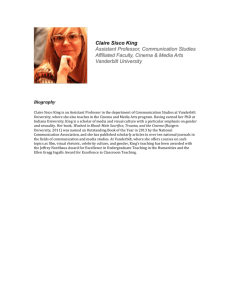

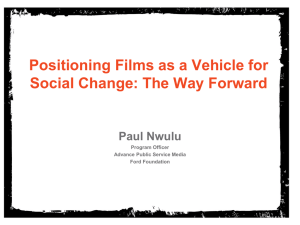
![[Lecture 4] from attractions to narrative integration 2012 for wiki](http://s2.studylib.net/store/data/005411128_1-612acd924ade64473e514356e531fdfd-300x300.png)
